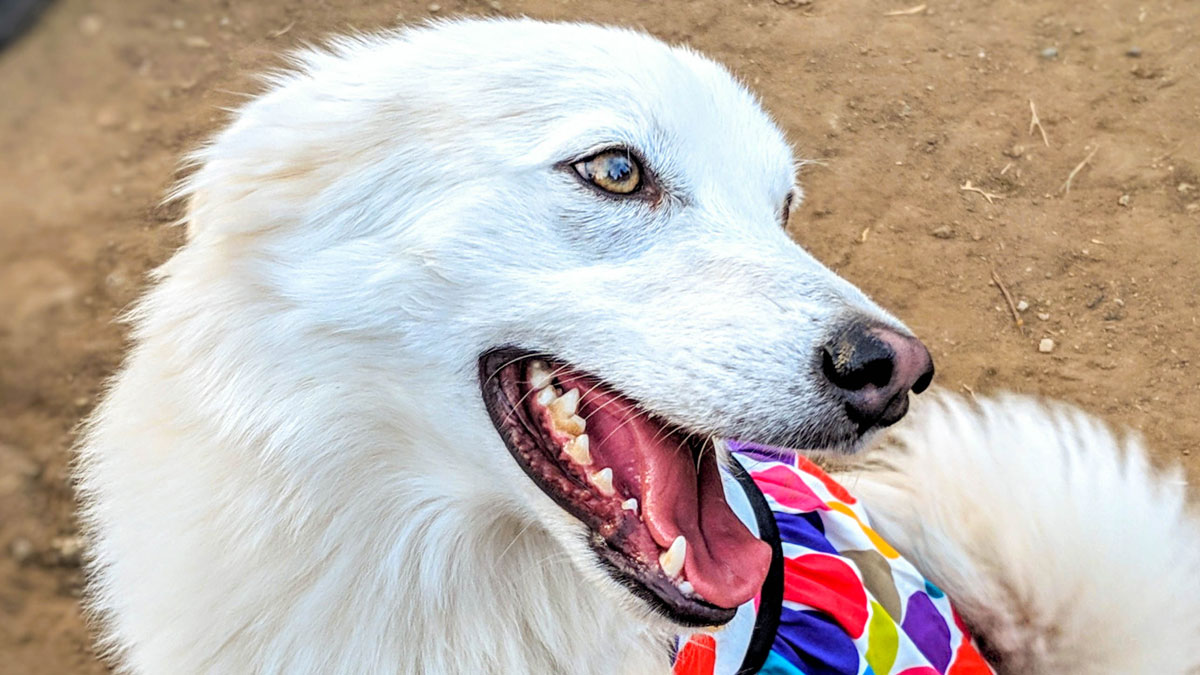Anxious Seeks Canine – Part 13: ‘Casu?’
Anxious Seeks Canine is a memoir blog series about a gay man living with Asperger’s, mental illness, and the relationships that may very well be fueling it. Names and identifying details have been changed to protect the privacy of all featured individuals. Except for the dog. Here’s part 1, 2, 3, 4, 5, 6, 7, 8, 9, 10, 11, 12, 13, 14, 15, 16, 17, and 18. Subscribe for more posts.
I
My lack of success in managing Cash’s anxiety problem had left me in something of a rut. But my trip to Sequoia National Park left me buoyed by new resolutions.
While I might not be able to give Cash acres of riverfront to roam, I could give him more opportunities to bond with me.
The first obstacle was my dog’s apparent disinterest in training, or anything approaching play. I started by introducing a daily regimen of training exercises.
Cash proved a quick study, mastering tricks like leaping over my hand, rolling over, spinning on the spot, “kissing” and “hugging”, in a matter of weeks.
Though I should point out that even these small victories were prefaced by resistance.
“Come on Cash, play dead,” I’d tell him. Cash would bark a feisty reply.
“No, no, no, I won’t!” he seemed to say.
While my dog could obey very basic instructions, where it came to any display of canine submission, he was, at the very least, disdainful.
After my requests to “fetch” incited only a sullen stare, I tried roughhousing with Cash instead. Very quickly he and I developed a repertoire of seemingly sadistic exercises, in which I would fake-choke Cash, hog-tie his paws with my hands and tickle his “armpits”.
Cash willingly played the role of hapless victim, lying on his back, teeth bared, tongue lolling to one side as Gremlin-like gargles boiled up from his throat.
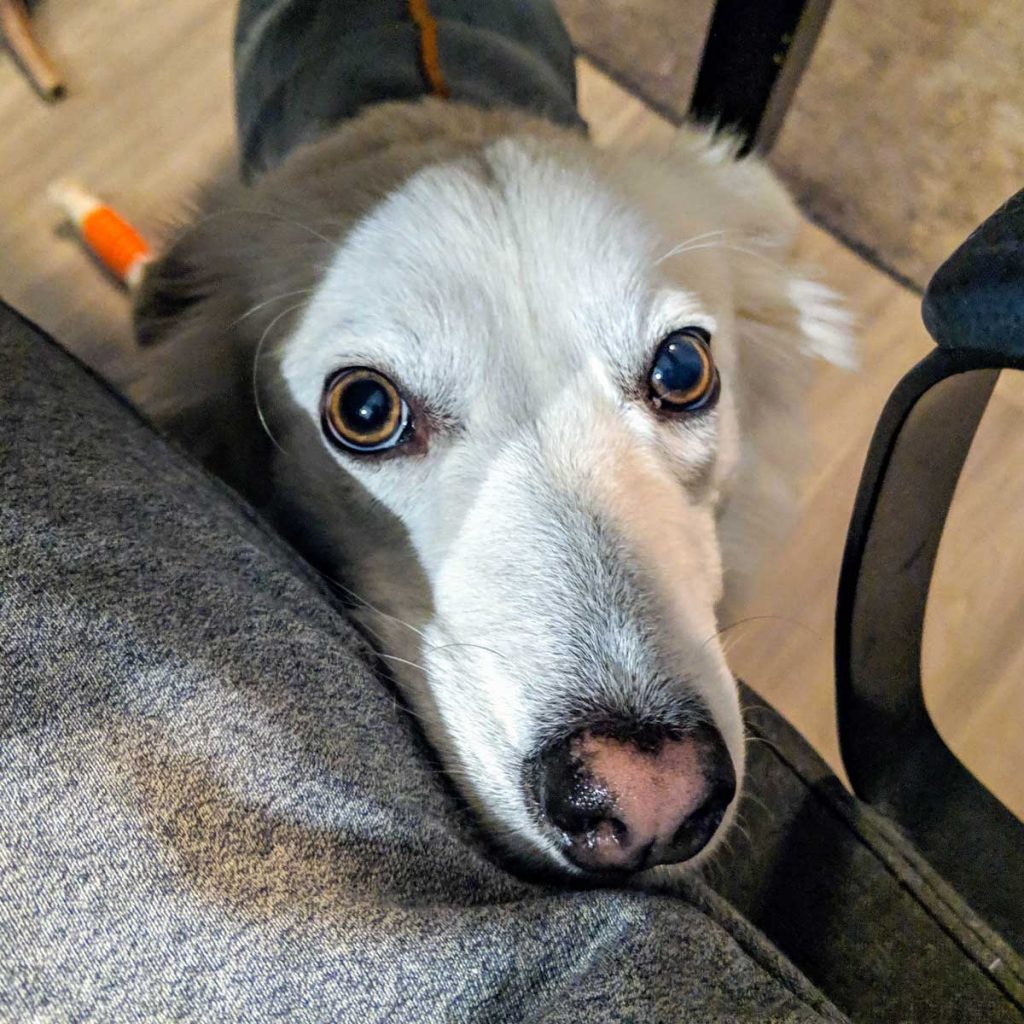
With Cash’s encouragement, this routine became an everyday ritual, my dog often running over to the drawer where the gloves were stored and barking until I took them out.
His request having been received, he would jump up onto the bed in readiness for a fresh round of “pretend murder”.
“Really, Cash,” I said. “Is this the kind of relationship you want to have?” To which my dog would respond with an affirmative bark.
And to be perfectly honest, it was an arrangement that worked perfectly for me. Even pretending to wring Cash’s neck offered some measure of catharsis.
“See? Look what you made me do,” I’d tell him, as he growled and flailed, and I inwardly cringed.
Given at least one neighbor had a clear view into my studio, I suppose I should have known better than to leave the curtains wide open.
What must they have thought, I wondered, watching me play-slamming Cash onto the bed, then hauling him into the air as if he were a toy and I the claw machine?
To the casual observer, it would have certainly appeared that I was abusing my dog. A casual acquaintance even once suggested as much.
“Oh come on,” I said skeptically. “He could run away at any time.”
Instead all Cash did was lie there, nibbling my fingers every time I reached to tickle him. Couldn’t they see? Cash was practically egging me on.
Discipline training, combined with these “quality time” activities, renewed our bond, and little by little Cash became less stubborn and more open to listening.
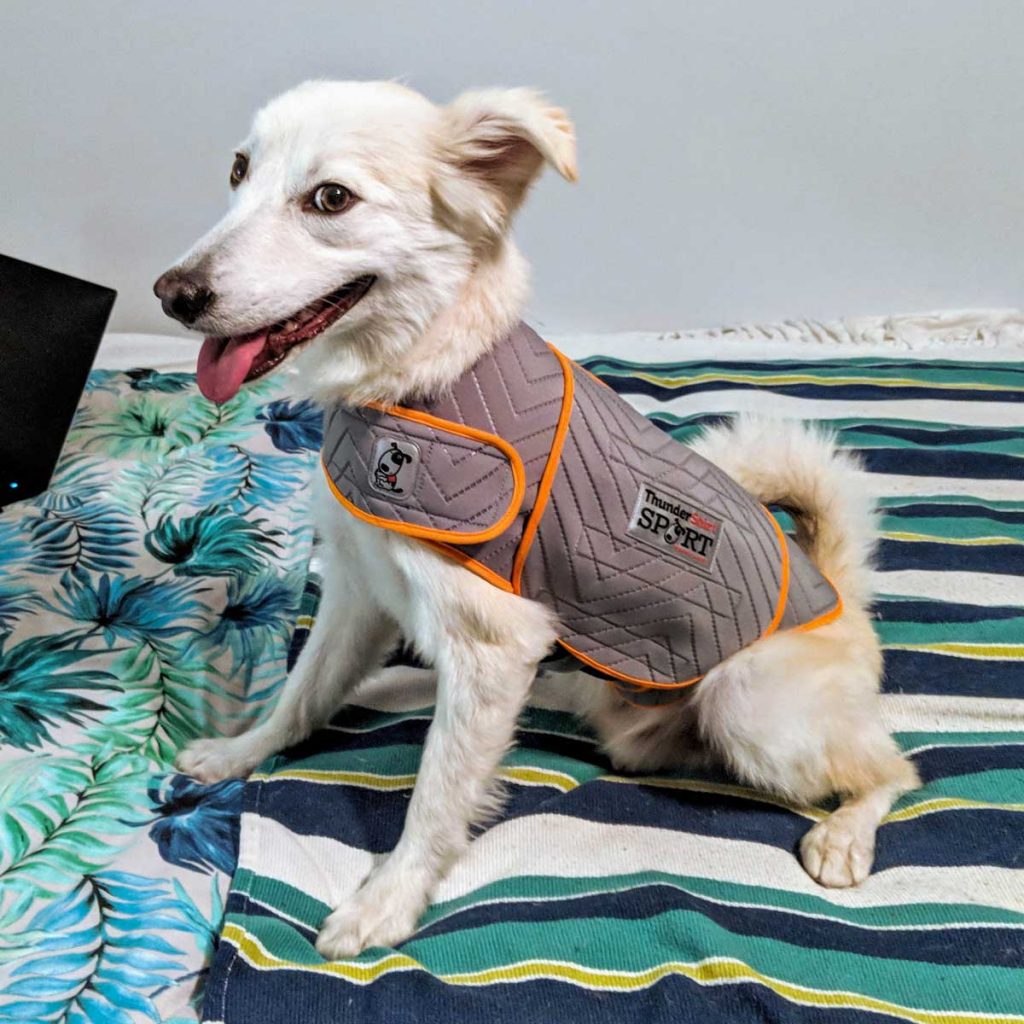
II
Still, the line between supporting my dog and accidentally reinforcing his anxiety remained a blurry one.
While working at my desk, Cash would sometimes plant his front paws on my chair to request my attention. When I tried to pick him up, he practically leaped into my lap.
This was a strange turn of events. My dog was actively seeking closeness, and not of the taking charge, possessive sort, as he had done in Three Rivers. One point to our relationship.
Then I noticed that letting Cash sit on my lap triggered whining episodes the minute I put him down. One point to the separation anxiety.
A casual survey of dog-calming devices led me to try CBD oil. Administering a dose with an eyedropper, I stood back and waited for the oil to take effect.
But even in increased dosages, the oil produced no more reaction than a scornful licking of the chops.
The second option was a body-hugging anxiety vest. The vest left Cash rigid and vacant-eyed. When he began silent panting, I put him on the bed beside me. Cash laid his head against my leg, leaving a slick of drool at the point of contact.
The vest’s sedative lasted for a couple of hours, but even a few days later, walking out of my apartment to collect a parcel, Cash seemed one step removed from his usual nervous peak.
The shirt was designed for only occasional use, and while it’s possible leaving it on him undermined its effectiveness, I figured there was no harm in testing its benefits for a few weeks.
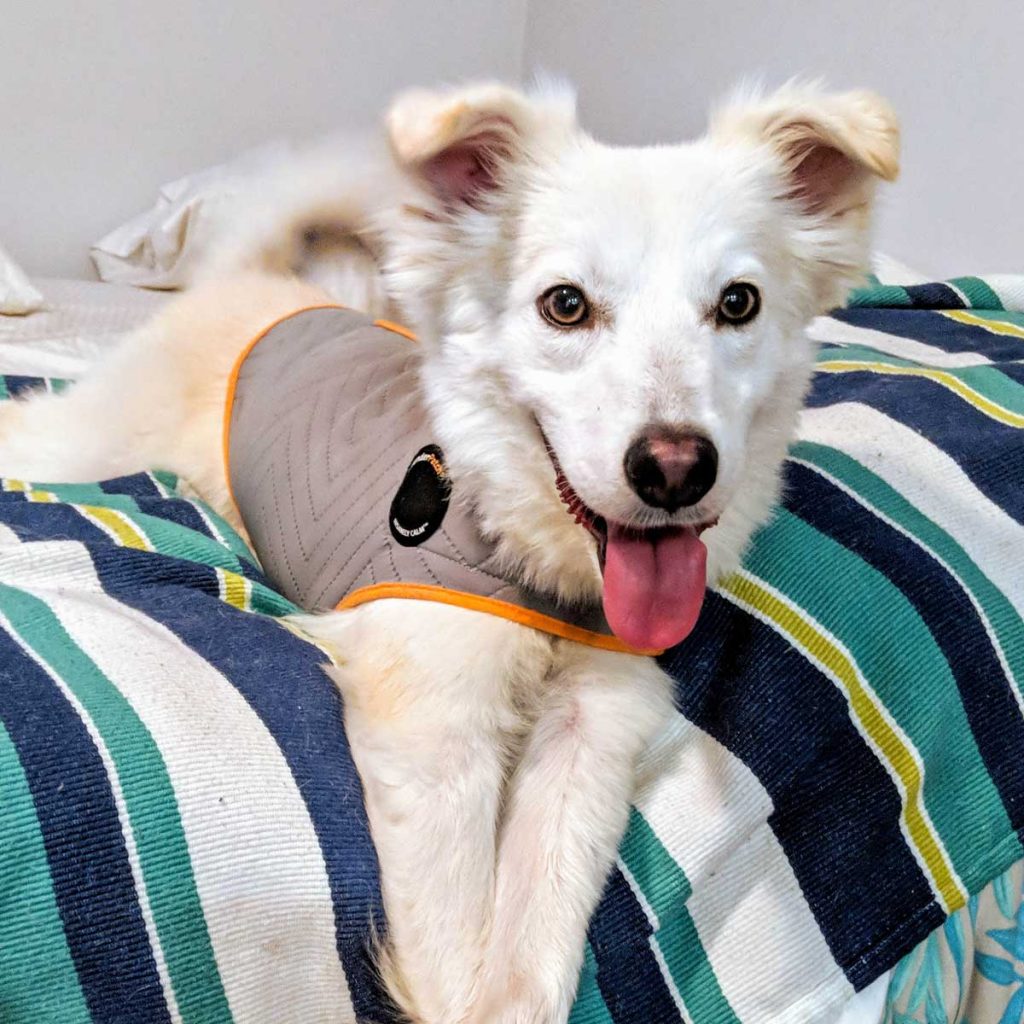
Confident in my ability as dog reformer par excellence, I decided that the time had at last come for Cash to make his official debut.
The occasion: the local dog park’s official Halloween pageant.
Cash fidgeted as I squeezed him into the costume I had purchased on Amazon: a 60s-inspired polka dot dress. When I was done, I stepped back to admire my handiwork.
It was, in my humble opinion, a great choice of outfit, if not a laudably progressive take on gender norms.
Of course, there were a few drawbacks to my chosen “costume”. Cash’s hair didn’t exactly lend itself to a beehive hairdo. So instead I opted to attach a couple of tiny bows to Cash’s head instead.
Stepping back to admire my handiwork, I saw Cash looking at me with the long silent groan of a dog who knows he has become his human’s plaything.
In advance of the pageant, I ran through the usual obedience training exercises. Cash performed each trick with little protest. Now, instead of five barks when asked to “play dead”, he barked only once.
“Good boy!” I cried, then got down on one knee. “Hug?”
Cash planted both paws on my shoulders, just as I had taught him.
“Kissy?” I prompted. Cash licked my ear. Not quite my cheek, but good enough. Knowing some extraordinary encouragement was in order, I squealed.
“Very good, Cash! Great work!” Cash leaped down, responding at once to my enthusiasm by play-nipping my leg.
We had by all appearances reached a milestone in our relationship. By how Cash bounced around in delight, he surely knew it too.
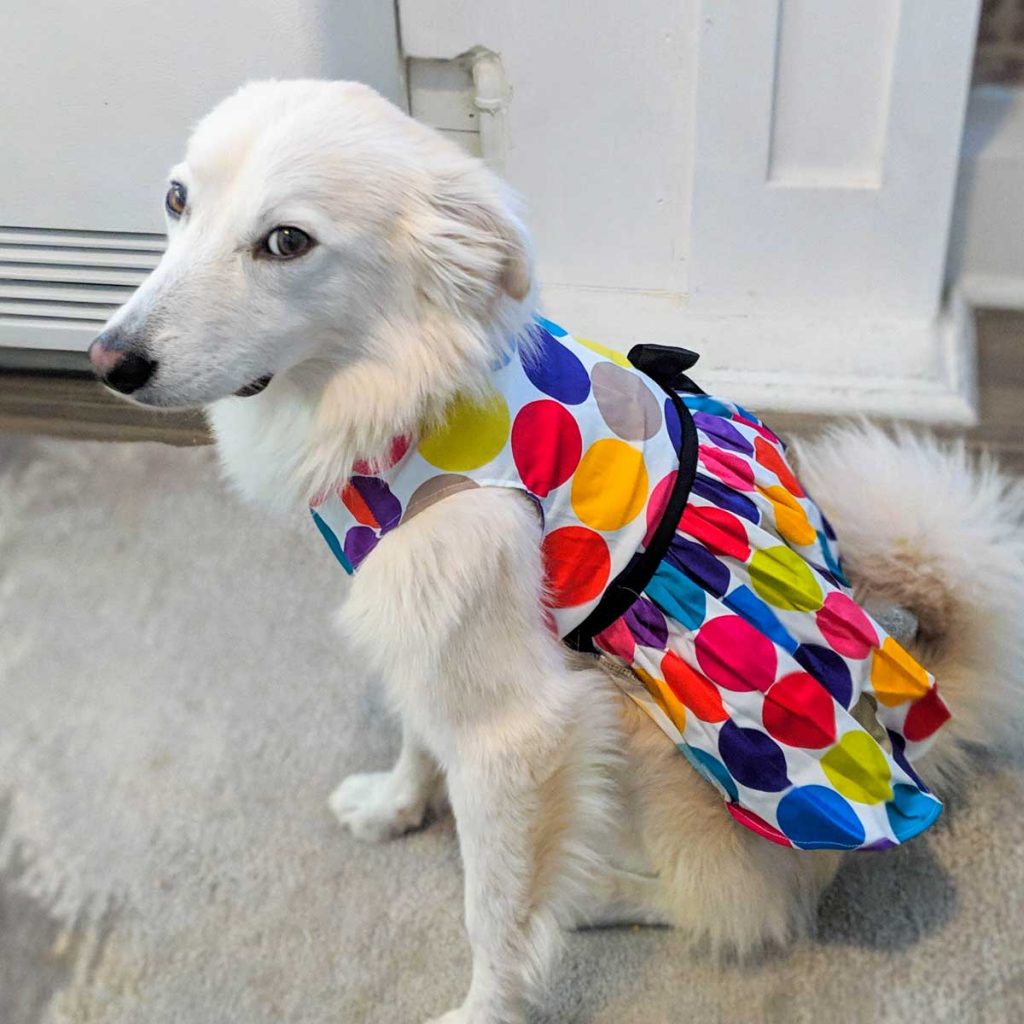
III
The day of Cash’s debut rolled around. For the occasion, I donned a shirt embossed with the words “I drooly love you”, then brushed out all the tangles in Cash’s hair and fitted him with his dress.
“Look at you,” I said. “You’re the very picture of cuteness, Cash!”
Cash padded awkwardly around. The dress was a tight fit, but it was too late now to order a replacement. We would just have to make do.
Shuttling my prize dog to the now-packed park, I unclipped the leash. Cash went bounding off, as I fought my way to the sign-in desk.
“I’d like to enter my dog in the contest,” I said. I meant to come off as serious and focused, but in hindsight I may have come off a tad militant.
“Just complete this form,” said a woman in a billowy dress and sun hat, handing me a clipboard.
Under “entrant”, I wrote in my usually sloppy script “Cash”. Under “costume” I wrote, simply, “1960s girl”.
A storm of barking erupted nearby. Turning, I caught sight of my dog mounting a shih tzu wearing a bumblebee outfit. Cash’s vigorous attempts at dominance – incongruous, given his current look – only had the effect of pulling off the other dog’s outfit.
Horrified, I abandoned the clipboard and rushed over to tear my dog away from his victim.
“I’m so sorry,” I said to the shih tzu’s owners, employing my usual dog park refrain. I led Cash over to a quiet corner and bent down, meeting his gaze.
“That’s enough,” I said. “No more acting up. You’ve been handed a golden opportunity, Cash. Today is your big chance to show people what an awesome dog you are. If you keep-”
I stopped. Cash’s gaze had turned towards a dog cavorting a few strides away.
“Cash. Cash? Hellooo. I’m talking to you.” Producing a treat, I waved it before his nose. That got his attention.
I let him have part of the treat, then tried running him through the usual battery of tricks. After sitting and “shaking hands”, however, Cash dashed off to pick a fight with a black-and-white Pointer.
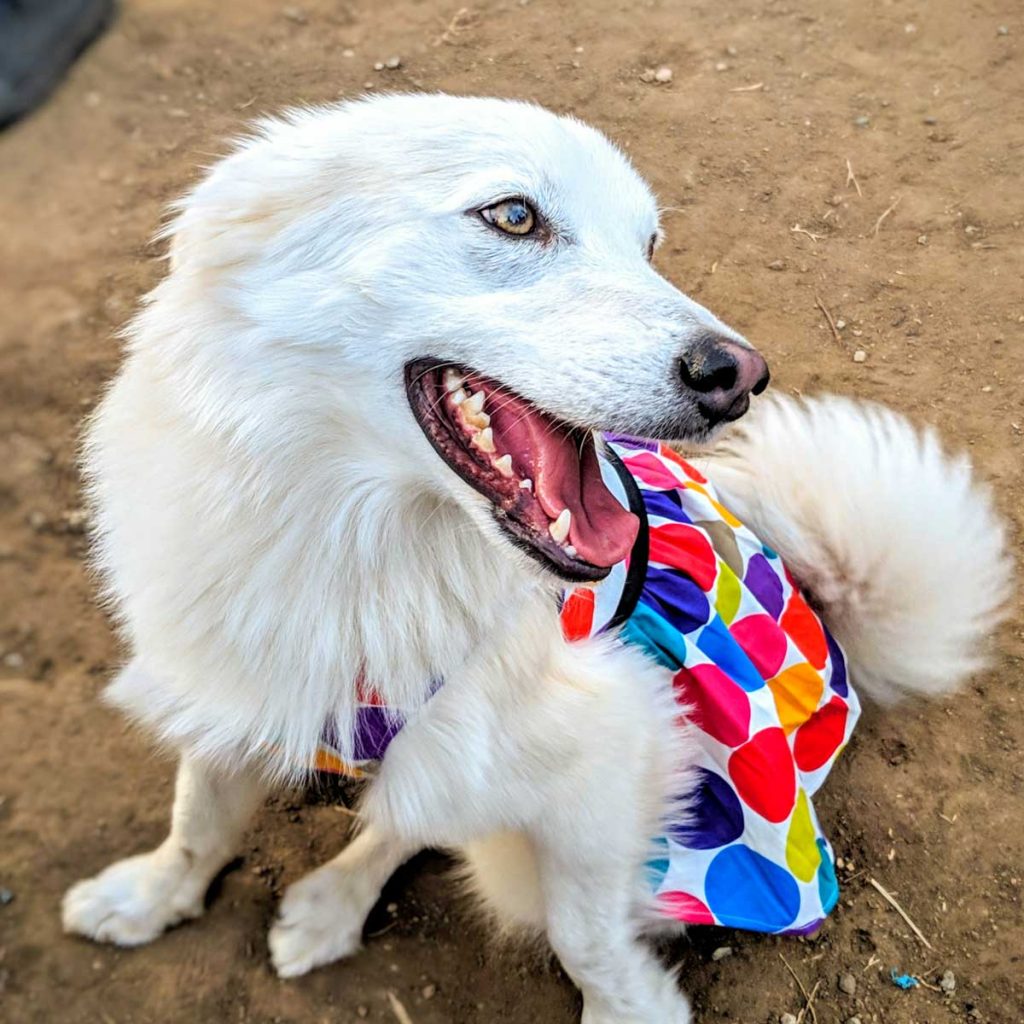
Acting out. That’s what this was. Cash was testing boundaries in public, knowing that so long as I was under scrutiny, he could escape punishment. The impudence of my dog!
I dragged him kicking and yapping away from the Pointer, the latest opponent in a seemingly endless roster of dogs-that-had-to-be-fought-because-they-were-too-big.
The pageant kicked off and names were called, owners leading their costumed pooches up to the impromptu stage – really an apron of concrete beside a sheltered table.
Nervous now, I counted down to the moment of Cash’s official appearance, anticipating the coos of admiration and laughter at my adorable dog’s antics.
“Casu?” the M.C. finally called, squinting at my entry form. “Ca… Casu?”
“Cash,” I called sourly. Yes, my handwriting could be sloppy, but to fumble my child’s grand entrance like this was catastrophic.
Leading Cash up to the front of the apron, I deadpanned the M.C, a woman wearing tasselled boots and a pair of floppy doggy ears, the end of her nose daubed with black face paint.
“And so what is Cash appearing as today?” she asked, extending a microphone.
“A 60s girl,” I said. The M.C. squinted at the form.
“So Cash knows a few special tricks?”
Sensing out moment was at hand, I called Cash to get his attention.
“Roll over. Go on, boy.”
To my complete mortification, Cash ignored me. He only had eyes for the various dogs gathered around the makeshift stage.
Call it stage fright, call it performance anxiety, but Cash – as I now belatedly realized – was overwhelmed.
If a visit to the usually sparsely populated park was usually enough to set him off, being crammed haunch-to-haunch into an enclosure with upwards of thirty dogs had sent him over the edge.
IV
Knowing that I had but only moments in which to salvage the situation, I held up a treat. Cash immediately honed in on it, drawn by some secret law of canine magnetism.
“Sit,” I instructed.
For a moment, Cash forgot the other dogs. His awareness narrowed to a single point: the piece of jerky dangling from the end of my fingers.
Cash sat, and before I could so much as praise him he lunged, scoffing the piece of dried meat down in one go. There was a delirious quality to the movement, as of an addict snatching at his next fix.
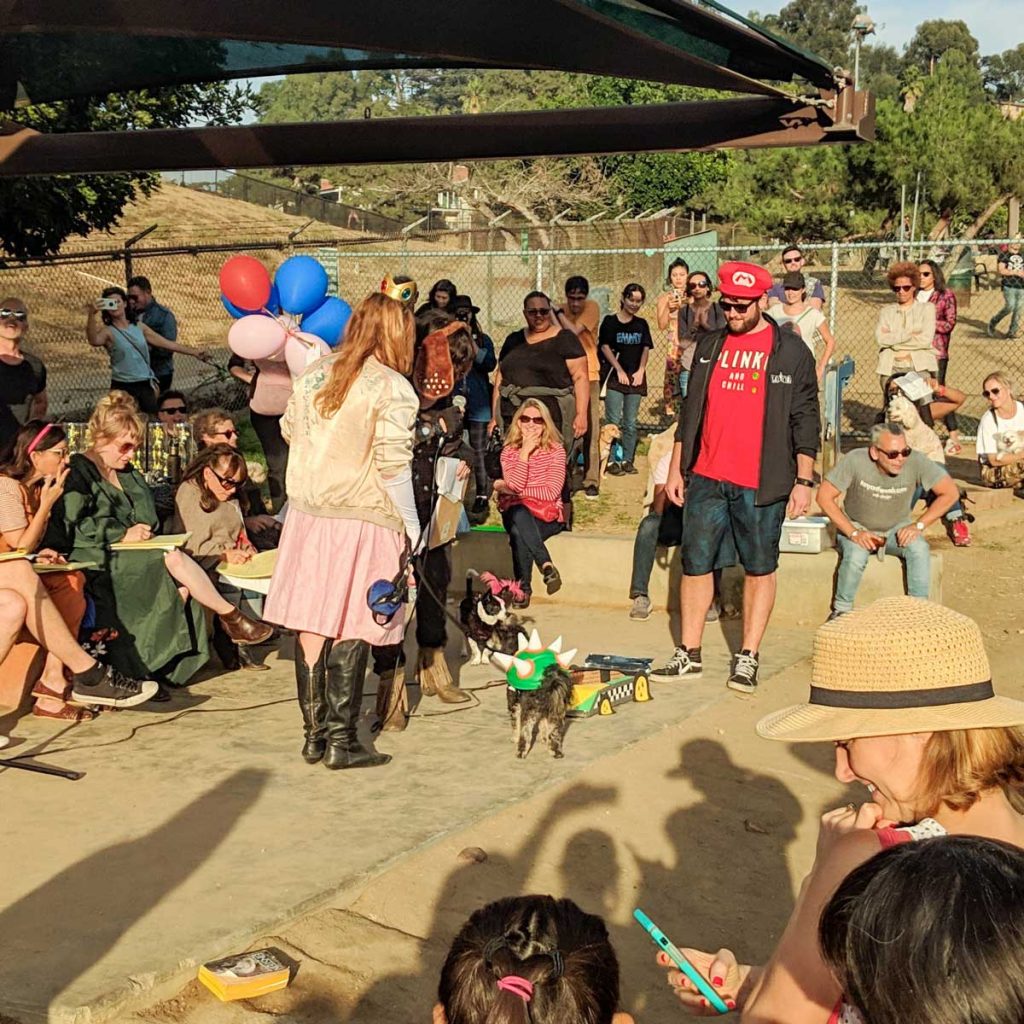
“Okay,” I thought. “Don’t panic.”
Holding up another piece of jerky, I called “Down”. Driven to the point of distraction, Cash again ignored me, making a pass at the treat.
“Spin,” I said, trying for another trick.. “Spin. Spin!”
What Cash was meant to do was twirl in place. What he did instead was offer a halfhearted twist, following my treat-hand as if I were clutching the dog equivalent of catnip.
The initially enthusiastic crowd grew still in sympathetic embarrassment. Who here, after all, hadn’t had their fur baby misbehave in public?
If Cash’s performance was a ship, it was now listing dangerously. Determined to put things back on course, I threw all my weight into turning the wheel.
Holding out one arm for Cash to use as a hurdle, I called: “Over!”
Rather than leaping, Cash craned his neck toward the jerky, pursuing it this way and that, until I had no chance but to let him have the treat.
The M.C. cleared her throat awkwardly.
“Thank you, Cash,” she said, cueing applause, and I knew then that the show was over.
Our carefully choreographed display of canine talent had failed, and any chance of winning the acclaim of the other dog owners snatched from our – no, my – grasp.
Like any stage mom so cruelly slighted, I stormed from the limelight into the backstage of humiliation. Of all the times Cash could have disobeyed me, why had it been now?
We lingered at the site of our spectacular defeat until the winners were announced. Cash’s name was conspicuously absent.
Gathering my dignity, I retreated to the car. The delirious quality that had possessed my dog went almost immediately into retreat.
No longer did Cash seem deaf to my commands; no longer did his eyes dart to and fro, captivated by the first sign of movement.
The pageant evidently had put too much of a strain upon my pup’s meager faculties. His ill-fated debut it seemed had been a tad too premature. Still, there was next year.
Then again, in a year’s time, Cash’s youthful charm may very well have faded. And even supposing it hadn’t, what was to stop my child from staging a second act of on-stage rebellion?
No. Cash, I resolved, offered the kind of spectacle that would ever be fit for public consumption.
Cheeks burning, I buckled him into the backseat and drove away.
Anxious Seeks Canine continues with Part 14: ‘Hypochondriac’.

Essy Knopf is a therapist who likes to explore what it means to be neurodivergent and queer. Subscribe to get all new posts sent directly to your inbox.
© 2025 Ehsan "Essy" Knopf. Any views or opinions represented in this blog are personal and belong solely to the blog owner and do not represent those of people, institutions or organizations that the owner may or may not be associated with in professional or personal capacity, unless explicitly stated. All content found on the EssyKnopf.com website and affiliated social media accounts were created for informational purposes only and should not be treated as a substitute for the advice of qualified medical or mental health professionals. Always follow the advice of your designated provider.


